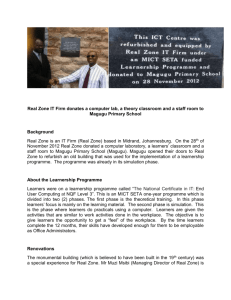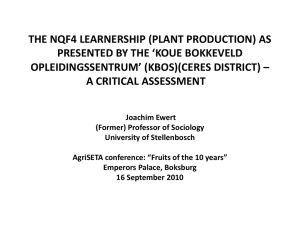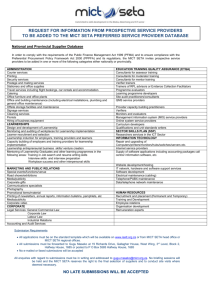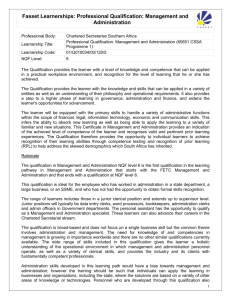Environmental Education Learnership (DoL registration number
advertisement
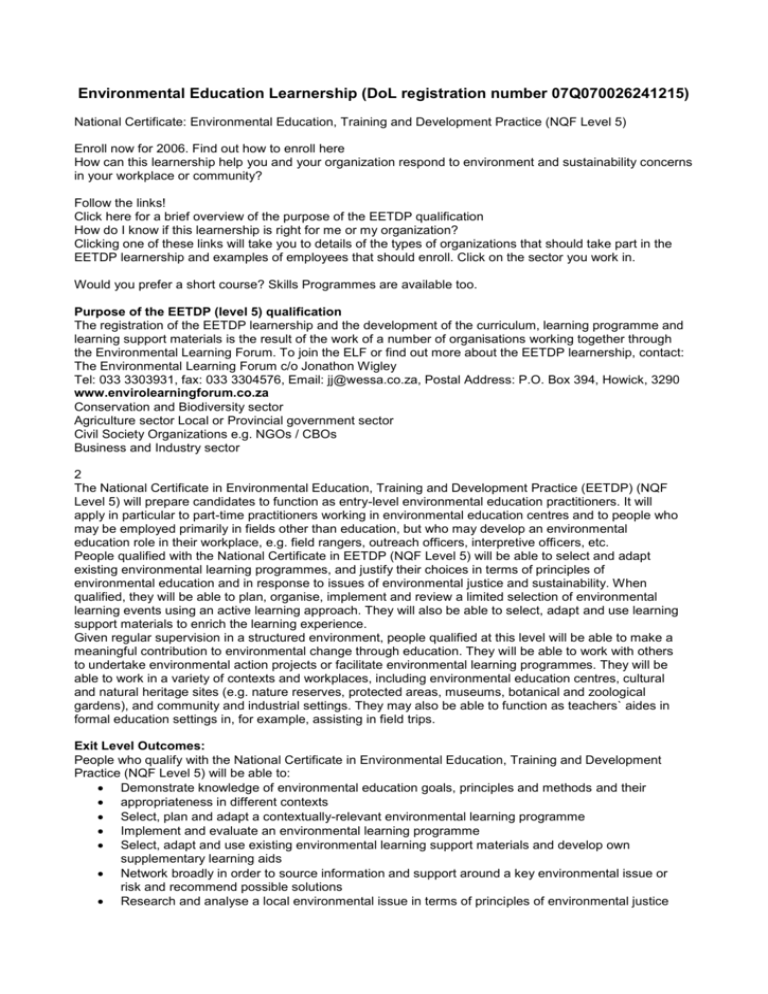
Environmental Education Learnership (DoL registration number 07Q070026241215) National Certificate: Environmental Education, Training and Development Practice (NQF Level 5) Enroll now for 2006. Find out how to enroll here How can this learnership help you and your organization respond to environment and sustainability concerns in your workplace or community? Follow the links! Click here for a brief overview of the purpose of the EETDP qualification How do I know if this learnership is right for me or my organization? Clicking one of these links will take you to details of the types of organizations that should take part in the EETDP learnership and examples of employees that should enroll. Click on the sector you work in. Would you prefer a short course? Skills Programmes are available too. Purpose of the EETDP (level 5) qualification The registration of the EETDP learnership and the development of the curriculum, learning programme and learning support materials is the result of the work of a number of organisations working together through the Environmental Learning Forum. To join the ELF or find out more about the EETDP learnership, contact: The Environmental Learning Forum c/o Jonathon Wigley Tel: 033 3303931, fax: 033 3304576, Email: jj@wessa.co.za, Postal Address: P.O. Box 394, Howick, 3290 www.envirolearningforum.co.za Conservation and Biodiversity sector Agriculture sector Local or Provincial government sector Civil Society Organizations e.g. NGOs / CBOs Business and Industry sector 2 The National Certificate in Environmental Education, Training and Development Practice (EETDP) (NQF Level 5) will prepare candidates to function as entry-level environmental education practitioners. It will apply in particular to part-time practitioners working in environmental education centres and to people who may be employed primarily in fields other than education, but who may develop an environmental education role in their workplace, e.g. field rangers, outreach officers, interpretive officers, etc. People qualified with the National Certificate in EETDP (NQF Level 5) will be able to select and adapt existing environmental learning programmes, and justify their choices in terms of principles of environmental education and in response to issues of environmental justice and sustainability. When qualified, they will be able to plan, organise, implement and review a limited selection of environmental learning events using an active learning approach. They will also be able to select, adapt and use learning support materials to enrich the learning experience. Given regular supervision in a structured environment, people qualified at this level will be able to make a meaningful contribution to environmental change through education. They will be able to work with others to undertake environmental action projects or facilitate environmental learning programmes. They will be able to work in a variety of contexts and workplaces, including environmental education centres, cultural and natural heritage sites (e.g. nature reserves, protected areas, museums, botanical and zoological gardens), and community and industrial settings. They may also be able to function as teachers` aides in formal education settings in, for example, assisting in field trips. Exit Level Outcomes: People who qualify with the National Certificate in Environmental Education, Training and Development Practice (NQF Level 5) will be able to: Demonstrate knowledge of environmental education goals, principles and methods and their appropriateness in different contexts Select, plan and adapt a contextually-relevant environmental learning programme Implement and evaluate an environmental learning programme Select, adapt and use existing environmental learning support materials and develop own supplementary learning aids Network broadly in order to source information and support around a key environmental issue or risk and recommend possible solutions Research and analyse a local environmental issue in terms of principles of environmental justice and sustainability Apply appropriate social protocols in the workplace and community Apply fundamental knowledge of environmental ethics to a field of work or study Demonstrate a general understanding of people-environment relationships and current environmental challenges Review a variety of approaches to learning, teaching and evaluation. The above has been taken from the qualification as found on the SAQA website at www.saqa.org.za 3 Organisations in this sector that should consider the EETDP learnership include National, Provincial and Local Conservation Authorities, South African National Biodiversity Institute (SANBI), Conservation and Environmental NGO’s such as the Endangered Wildlife Trust or Wildlife and Environment Society of South Africa, Parks and Gardens departments of municipalities, museums, zoological gardens, aquariums, private nature reserves, environmental education centres, community-based conservation initiatives, etc. Potential EETDP Learners Typical examples of potential learners for the EETDP learnership in the conservation sector are provided: Environmental Education Centres Environmental Education Practitioners working at Environmental Education Centres (these include EE centres in nature reserves, botanical gardens, museums, zoos, urban settings, etc.) Examples of potential entry-level EETDP learners from EE Centres include part time staff, volunteers, assistant education officers, other staff who develop an interest in EE (e.g. admin staff or grounds staff) and; Existing professional EE staff who may have a natural science or other degree/qualification and are looking for professional development opportunity to develop education/communication skills (such staff may be more interested in skills programmes) Existing staff who have no formal qualification but do have years of experience in the field and require a formal qualification to open up their career options. Conservation and Environmental NGO’s Extension/communications staff of conservation or environmental NGO’s, for example the Endangered Wildlife Trust, who work with programmes around endangered species or threatened ecosystems or habitats. o Examples of potential entry-level learners include assistant staff or community members that get actively involved with the relevant programme and start to play an educational/communication role or assist with particular aspects of the extension programme and; o Existing professional extension staff who often come from a scientific background and want to develop educational/communications skills to support the educational component of their work (see skills programmes). o Existing staff who have no formal qualification but do have years of experience in the field and require a formal qualification to open up their career options. Formal Conservation Agencies/authorities Community Conservation Officers or other extension/communications staff of National or Provincial conservation authorities, e.g. SAN Parks or Ezemvelo KZN Wildlife who work with the general public and communities surrounding protected areas. o Examples of potential entry-level learners include community leaders or youth that have become involved in projects or initiatives related to the protected area and that involve an educational/communications component and; o Existing officers who may have a natural sciences qualification and want to develop their educational/communications skills (see skills programmes). o Existing staff who have no formal qualification but do have years of experience in the field and require a formal qualification to open up their career options. 4 There is a clear mandate for local government to engage seriously with environment and sustainability education and training. This mandate comes from a diversity of legislation as well as international conventions and agreements. Relevant legislation includes the South African Constitution, the National Environmental Management Act (NEMA), Local Government Municipal Systems Act and many more. International commitments include Agenda 21 adopted at the 1992 UN Conference on Environment and Development (UNCED), the Johannesburg Plan of Implementation from the World Summit on Sustainable Development, the African Mayors Declaration on Sustainable Development and so on. There are two “types” of environment and sustainability education happening in a local government context: 1) Environmental Education activities for communities and the general public (including schools) that is conducted by the relevant division or section of the municipality (e.g. Parks and Gardens, or some municipalities even have a separate Environment division or department). This type of EE aims towards more sustainable lifestyles by the communities and public living in that municipal area. 2) Environmental Education and training internally of municipal employees towards more environmentally sustainable practice and activities including service delivery, infrastructure development and land-use planning, etc. Potential EETDP Learners Municipal EE Centres and Programmes The following are examples of the types of EE Practitioners that should enroll for the EETDP learnership and that work with the public (i.e. category 1 above) in local government contexts: Many municipalities have environmental education centres with EE practitioners involved in education programmes with schools and the public around particular environmental concerns in that area (e.g. health & sanitation, waste, energy, green spaces, etc.). o Potential entry-level EETDP learners could be assistant education staff at these centres of other staff such as admin or grounds staff who want to develop their careers into the EE aspect of the work at these centres. o Existing Environmental Education Practitioners may want to do the full learnership or skills programmes as these staff often have a teaching or a natural sciences background and may want to develop their environmental education and communications skills. Internal Education and Training in Municipalities Most municipalities have an internal education and training department responsible for planning and implementing training of municipal employees. Many also have an environmental management or environmental health department responsible for environmental issues in the municipality. Staff within both these departments are potential learners for the EETDP learnership to enable ongoing environment and sustainability education of municipal staff to better enable sustainable practice throughout the municipality. w Potential EETDP learners include Skills Development Facilitators, Trainers, HRD managers, environmental managers, environmental health inspectors etc. that may have a training or environmental science background and will improve their ability to develop and run environment and sustainability training for employees in all departments in the local government concerned. Such personnel may prefer the option of skills programmes. 5 The current worldwide concern with sustainable development and commitments by governments and industry through international summits and conventions such as the World Summit on Sustainable Development as well as a diversity of legislation relating to the environment provide a strong imperative for a comprehensive and cross-disciplinary approach to education for sustainable development in industry and business contexts. The EETDP learnership provides a starting point for those companies that take the sustainable development challenge seriously and see the development of appropriate environment and sustainability skills within the organisation as a key step towards more sustainable practice. Potential EETDP Learners Examples of the personnel that will be appropriate learners for the EETDP learnership include: Internal education and training staff such as Skills Development Facilitators and Human Resource Development practitioners/managers that, through the learnership, will develop their ability to develop in-house education and training courses for personnel at all levels in the company that address environment and sustainability concerns. Safety, Health and Environment Officers who often tend to pick up a communications and even education and training role in the company – the EETDP learnership will develop both their environmental and educational capacities. Environmental managers or other personnel within Environmental Management divisions/departments in the company. Often such personnel have good technical environmental training and could develop their communication/education skills through the EETDP learnership. For those not interested or without the time for the full learnership, skills programmes are another less intensive and time consuming option. 6 The environmental challenges facing the agricultural sector require a well thought out and comprehensive approach to environment and sustainability education and training within the sector. The sector itself is very diverse, ranging from small scale subsistence farming activities to the huge monoculture operations of agricultural corporations. Operating within this complex and diverse sector, are many individuals and organisations seeking environmentally sustainable alternative practices to the current unsustainable practice so evident in much commercial and subsistence agriculture today. The EETDP learnership offers an opportunity to those working with others through education, training and communication to develop the knowledge, values and skills that will contribute towards the development of sustainable agricultural practice. Potential EETDP Learners Rural Development and Agricultural NGO’s w Environmental, Rural Development and Agricultural NGO’s are often engaged in community agricultural projects or in programmes supporting small-scale farmers in some form of agricultural extension work. o Potential entry-level learners for the EETDP learnership include assistant field-staff, field-staff that may have years of experience but little or no formal education, community members that are keen to get involved with education and training of others, etc. o Professional extension or field staff who may have an agricultural or social science qualification or background and want to develop their environment and education skills to better be able to incorporate environment and sustainability concerns in their work. Note: skills programmes are also available. Provincial Agricultural Departments Most of the provincial departments of agriculture have agricultural extension staff whose work includes educational, support and communication roles in their interactions with farmers. o Potential entry-level learners for the EETDP learnership include extension staff who may have no formal qualifications or incomplete qualifications and wish to develop their career potential and community assistants who often play an important role in liaison and support between the department and community structures. o Most agricultural extension staff will already have a qualification in the field of agriculture or the natural sciences. The EETDP learnership provides a professional development opportunity to develop their environmental and educational knowledge and skills to better be able to introduce environment and sustainability concerns into their work. Note: skills programmes are also available. Commercial Agricultural Institutions w Many large commercial corporations or stakeholder groups representing a certain agricultural subsector have in-house training institutions responsible for research, development and education and training. o Potential EETDP learners for such contexts include Skills Development Facilitators or other training personnel, Extension Officers and Environmental Managers who will develop their skills around environment and sustainability concerns and developing education and training courses to deal with these. Such personnel may be more interested in skills programmes rather than a full learnership. Go Back to first page The EETDP Learnership for Civil Society Organisations PDF created with pdfFactory trial version www.pdffactory.com 7 South Africa has a diverse civil society sector of NGO’s and CBO’s engaged in activities dealing with environment and sustainability, often with a particular concern for environmental justice such as the unequal distribution of the negative impacts and risks of development. Examples of organisations in this sector include the Environmental Justice Networking Forum (EJNF), Earthlife Africa, Green Network, etc. Potential EETDP Learners Many of the environmental NGO’s and CBO’s engage in activism, lobbying and campaigns that, although not traditionally seen as environmental education activities, do comprise an element of communication and working with others in educational ways. o Examples of entry-level learners for the EETDP learnership include campaign managers, activists and community members involved in campaigns or projects dealing with a particular environmental concern who often have experience in the field but no formal qualification. The EETDP learnership will help improve their ability to develop a stronger educational component to their work and their ability to research and engage with environmental issues and risks in a more rigorous manner. o Many of the activists and campaign leaders are qualified either in the natural sciences (e.g. environmental management) or come from other professions and may find that the EETDP learnership (or skills programmes) may help develop their ability to better deal with the environment and sustainability concerns they are working with through building better teaching and learning processes with those they engage with around particular environmental issues and risks. Go Back to first page PDF created with pdfFactory trial version www.pdffactory.com 8 How to take part in the EETDP learnership For general information and guidelines on learnerships, visit the Department of Labour website at www.labour.gov.za If you are an Employer: STEP 1. Identify workers or unemployed/volunteers that you would like to place on the EETDP learnership (guidelines for this are provided – follow the links to your sector from the first page) STEP 2. Check if your company or organisation has a Skills Development Facilitator (SDF) and a Workplace Skills Plan (WSP) – if it does, meet with the SDF and get him/her to include the EETDP learnership for the identified employees in the WSP. If you do not have a SDF or WSP go to step 3. STEP 3. Contact the SETA to which your organisation pays its Skills Development Levy and speak to the Learnerships Manager or other relevant person and request the EETDP learnership for the identified staff/volunteers from step 1. (Contact the Environmental Learning Forum – contact details on first page – if you are not sure who your line-SETA is or who to speak to). If you do not pay the SDL and therefore do not have a line-SETA, then contact the ETDP SETA on 011 – 8075621) STEP 4. When choosing an accredited education and training provider, specify to the SETA that you would like the training provider to be a member of the Environmental Learning Forum (ELF) – please contact ELF, details on the first page, for more information. STEP 5. Identify people in your organisation who will be mentors and coaches to the learners on the EETDP learnership. A coach is usually the line-manager of the learner or the person the learner reports to and is responsible for ensuring that workplace learning is well supported and relevant to the learnership. A mentor is usually a more experienced colleague of the learner who can provide support and advice to strengthen workplace learning. STEP 6. With the relevant SETA, the learner and the provider now all identified you can now set up and sign a learnership agreement and employment contracts for unemployed learners. If you are an Employee: STEP 1. Read through the section in this document that gives an overview of the EETDP qualification to see if this is the right qualification for you. You should have a clear idea of how this learnership will contribute to your professional development and career path. You can also follow the links from the first page to the relevant sector to get a better idea of who potential candidates for the learnership in your sector are. STEP 2. Meet with your manager or, if your organisation has one, with your Skills Development Facilitator and tell them you want to do the EETDP Learnership. Show them this document and point out the section that gives an overview of the EETDP qualification and the section relevant to the sector you work in. Finally show them the steps for Employers above and ask them to take up the matter. If you are Unemployed: STEP 1. Register as a work-seeker at your nearest labour centre (you can get the contact details for this at the Department of Labour website given above). When filling out the registration form, indicate that the qualification/type of training you are interested in is environmental education. Follow all of the steps as given in the table above. STEP 2. The Environmental Learning Forum is able to help unemployed people with some experience or interest in environmental education find an organisation that is willing to host them for a learnership. See contact details on first page. Go back to first page PDF created with pdfFactory trial version www.pdffactory.com 9 EETDP Skills Programmes A group of organisations have been working together over the past two years to have the EETDP qualification registered as a learnership and formed the Environmental Learning Forum in order to work together to produce a high quality and relevant learning programme and learning support materials for accredited providers to use when offering the EETDP qualification. While planning the EETDP curriculum, the ELF decided to structure it in such a way that the full qualification is broken down into 5 modules that are each potential stand-alone skills programmes. A skills programme is a short course that is based on a minimum of one unit standard of a qualification and must be offered by an accredited training provider for the learners to obtain the credits for the unit standard(s) that make up the skills programme. At any stage, the learners can obtain additional unit standards and eventually build up a full qualification through a series of short courses. If you are interested in one of the EETDP skills programmes, please contact the ELF, see contact details on the first page of this document.
